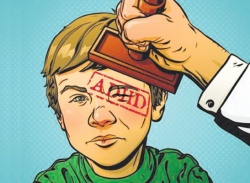Difference between revisions of "ADHD"
(Info about causes of ADHD) |
m (ON_cons don't work..?) |
||
| (4 intermediate revisions by 3 users not shown) | |||
| Line 1: | Line 1: | ||
{{concept | {{concept | ||
|wikipedia=https://en.wikipedia.org/wiki/ | |wikipedia=https://en.wikipedia.org/wiki/ | ||
| − | |ON_constitutes= | + | |ON_constitutes=mental disorder, enemy image |
| − | |description=A | + | |constitutes=Disease |
| + | |description=A controversial, increasingly widely-diagnosed psychological disorder that big pharma seems to be using as a pretext for prescribing otherwise-illegal, highly addictive “performance enhancing” stimulants to improve the academic performance of schoolchildren. | ||
|so_called=1 | |so_called=1 | ||
|image=ADHD.jpg | |image=ADHD.jpg | ||
|start=2001 | |start=2001 | ||
}} | }} | ||
| − | '''ADHD (Attention deficit hyperactivity disorder)''' is an emerging [[ | + | '''ADHD (Attention deficit hyperactivity disorder)''' is an emerging [[mental disorder]], according to the [[official narrative]]. It lacks much of a clinical basis and is diagnosed from a checklist of behaviours symptomatic of inattention to authority.<ref>https://www.zerohedge.com/political/why-are-they-drugging-students</ref> |
| + | |||
==Epidemiology== | ==Epidemiology== | ||
| − | The | + | {{YouTubeVideo |
| + | |align=left | ||
| + | |code=8SivUTp9qf0 | ||
| + | |caption=New research looked at two common types of meds for ADHD -- amphetamine, such as Adderall, and methylphenidate, such as Ritalin -- and found the amphetamine drugs were linked to a slightly greater risk of developing psychosis. Dr. Lauren Moran, a psychiatrist at McLean Hospital, joins CBSN with details. | ||
| + | }} | ||
| + | The disorder primarily seems to affect children. Major health institutions like the [[CDC]] say the cause of ADHD is unknown, but genetic factors are believed to play an important role. <ref> https://www.cdc.gov/ncbddd/adhd/facts.html</ref> | ||
Development of ADHD has been shown to be correlated with [[fluoridation]] of drinking water,<ref>http://www.newsweek.com/water-fluoridation-linked-higher-adhd-rates-312748</ref>, lead exposure during pregnancy, brain injury <ref> https://www.cdc.gov/ncbddd/adhd/facts.html#Causes</ref>, influenza vaccination<ref>https://yaledailynews.com/blog/2017/02/21/vaccines-linked-to-mental-disorders-by-yale-study/</ref> and with consumption of [[digital media]].<ref>http://time.com/4474496/screens-schools-hoax/</ref><ref>https://whowhatwhy.org/2018/07/21/researchers-link-mobile-device-use-to-adhd-symptoms-in-teens/</ref>. | Development of ADHD has been shown to be correlated with [[fluoridation]] of drinking water,<ref>http://www.newsweek.com/water-fluoridation-linked-higher-adhd-rates-312748</ref>, lead exposure during pregnancy, brain injury <ref> https://www.cdc.gov/ncbddd/adhd/facts.html#Causes</ref>, influenza vaccination<ref>https://yaledailynews.com/blog/2017/02/21/vaccines-linked-to-mental-disorders-by-yale-study/</ref> and with consumption of [[digital media]].<ref>http://time.com/4474496/screens-schools-hoax/</ref><ref>https://whowhatwhy.org/2018/07/21/researchers-link-mobile-device-use-to-adhd-symptoms-in-teens/</ref>. | ||
==Treatment== | ==Treatment== | ||
| − | The main treatment of ADHD is pharmaceutical stimulants derived from popular recreational drugs. Initially, [[Ritalin]], a drug based on cocaine, which has unresearched long term consequences (though it has been suggested that they "addle the brain over the long term"<ref>[[Document:The CIA - long-range planning for a drugged and debilitated society]]</ref>), was the treatment of choice. Later it was mostly replaced by highly addictive [[amphetamine]]-based drugs such as [[Adderall]] and Vyvanse. A 2016 study on rats suggested "that young people using amphetamines may have changes in memory and attention well into their thirties."<ref>http://www.madinamerica.com/2016/04/amphetamines_adolescents_ratstudy/</ref> | + | The main treatment of ADHD is pharmaceutical stimulants derived from popular recreational drugs. Initially, [[Ritalin]], a drug based on [[cocaine]], which has unresearched long term consequences (though it has been suggested that they "addle the brain over the long term"<ref>[[Document:The CIA - long-range planning for a drugged and debilitated society]]</ref>), was the treatment of choice. Later it was mostly replaced by highly addictive [[amphetamine]]-based drugs such as [[Adderall]] and Vyvanse. A 2016 study on rats suggested "that young people using amphetamines may have changes in memory and attention well into their thirties."<ref>http://www.madinamerica.com/2016/04/amphetamines_adolescents_ratstudy/</ref> |
===Questionable efficacy=== | ===Questionable efficacy=== | ||
Latest revision as of 21:02, 30 May 2024
(Disease) | |
|---|---|
 | |
| Start | 2001 |
| A controversial, increasingly widely-diagnosed psychological disorder that big pharma seems to be using as a pretext for prescribing otherwise-illegal, highly addictive “performance enhancing” stimulants to improve the academic performance of schoolchildren. | |
ADHD (Attention deficit hyperactivity disorder) is an emerging mental disorder, according to the official narrative. It lacks much of a clinical basis and is diagnosed from a checklist of behaviours symptomatic of inattention to authority.[1]
Epidemiology
| New research looked at two common types of meds for ADHD -- amphetamine, such as Adderall, and methylphenidate, such as Ritalin -- and found the amphetamine drugs were linked to a slightly greater risk of developing psychosis. Dr. Lauren Moran, a psychiatrist at McLean Hospital, joins CBSN with details. |
The disorder primarily seems to affect children. Major health institutions like the CDC say the cause of ADHD is unknown, but genetic factors are believed to play an important role. [2]
Development of ADHD has been shown to be correlated with fluoridation of drinking water,[3], lead exposure during pregnancy, brain injury [4], influenza vaccination[5] and with consumption of digital media.[6][7].
Treatment
The main treatment of ADHD is pharmaceutical stimulants derived from popular recreational drugs. Initially, Ritalin, a drug based on cocaine, which has unresearched long term consequences (though it has been suggested that they "addle the brain over the long term"[8]), was the treatment of choice. Later it was mostly replaced by highly addictive amphetamine-based drugs such as Adderall and Vyvanse. A 2016 study on rats suggested "that young people using amphetamines may have changes in memory and attention well into their thirties."[9]
Questionable efficacy
A 2013 story by The Atlantic, Study: ADHD Symptoms Persist Despite Medication in 9 Out of 10 Kids, reported on "a new study out of Johns Hopkins suggests that the "benefits" used to rationalize medication might not even exist".[10]
References
- ↑ https://www.zerohedge.com/political/why-are-they-drugging-students
- ↑ https://www.cdc.gov/ncbddd/adhd/facts.html
- ↑ http://www.newsweek.com/water-fluoridation-linked-higher-adhd-rates-312748
- ↑ https://www.cdc.gov/ncbddd/adhd/facts.html#Causes
- ↑ https://yaledailynews.com/blog/2017/02/21/vaccines-linked-to-mental-disorders-by-yale-study/
- ↑ http://time.com/4474496/screens-schools-hoax/
- ↑ https://whowhatwhy.org/2018/07/21/researchers-link-mobile-device-use-to-adhd-symptoms-in-teens/
- ↑ Document:The CIA - long-range planning for a drugged and debilitated society
- ↑ http://www.madinamerica.com/2016/04/amphetamines_adolescents_ratstudy/
- ↑ https://www.theatlantic.com/health/archive/2013/02/study-adhd-symptoms-persist-despite-medication-in-9-out-of-10-kids/273097/